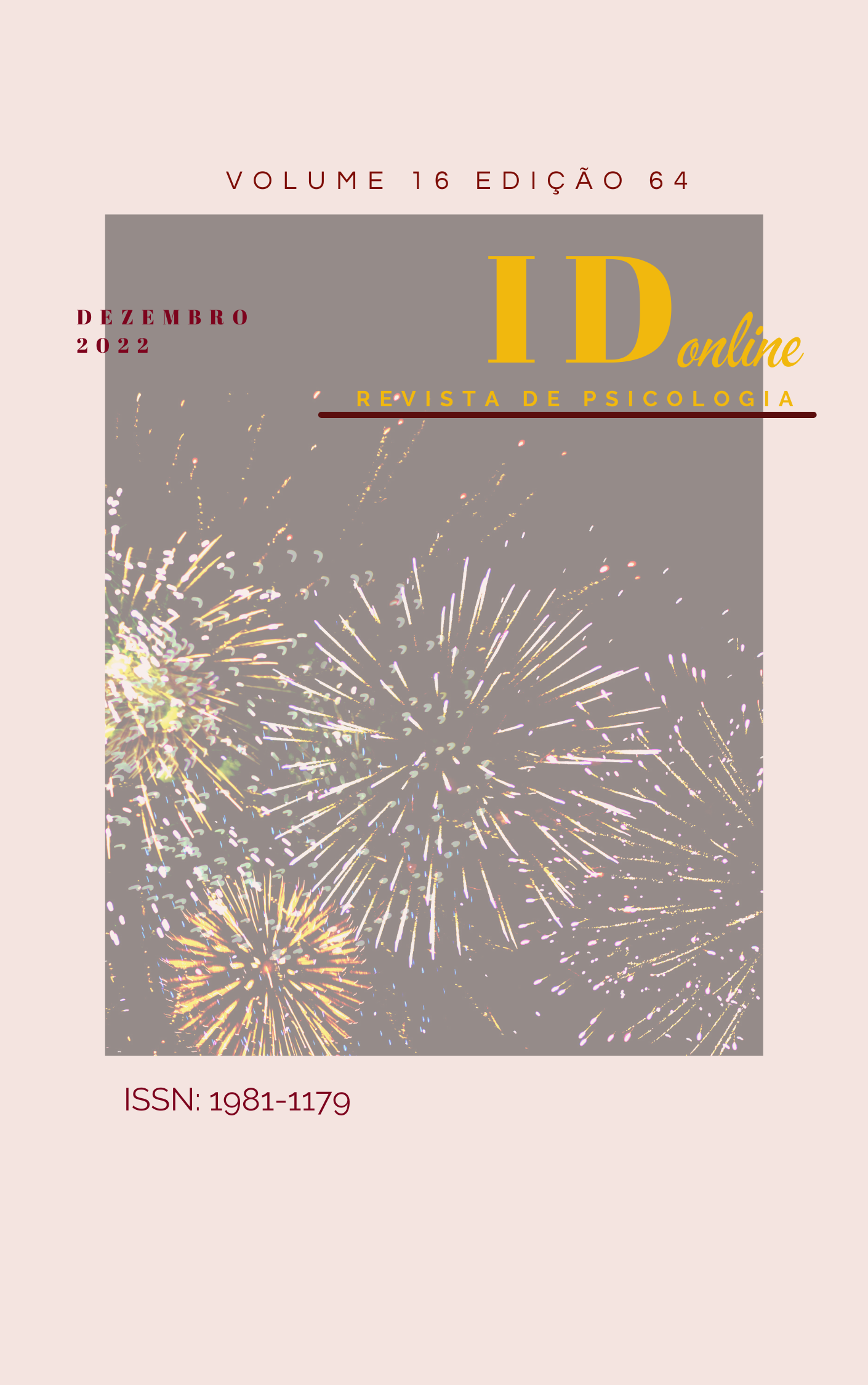The Practice of Reading and Argumentation: Essential Elements for Text Production in High School
DOI:
https://doi.org/10.14295/idonline.v17i69.3911Keywords:
Educators, High School Students, Active Methodologies, Text ProductionAbstract
This research seeks to analyze the teaching of textual production in high school, in the argumentative context, addressing the theme of the teaching-learning process in the student's role. It is possible to understand that the teaching process of the Writing subject, currently considered an elective component in the state network, after the reformulation of the New High School, started to need several points of support to be well developed, among them the relationship between history and geography. Therefore, it is necessary to address the role of the teacher in teaching textual production, as a contributor to the process of understanding and interpreting the subject in question. During the work, the contributions of the use of active methodologies in the student learning process are also discussed, since the entire state and private network has high-quality devices and internet to assist them in the teaching-learning process. In this way, it is proposed to emphasize the different possibilities that teaching the language area, together with the humanities area, has to provide quality and equitable education, which allows for more fruitful and meaningful teaching. The present work is analyzed in more depth through a discussion carried out in this research on pedagogical practices and methods linked to active methodologies in the school institution, bringing the main objective to work on the difficulties encountered in teaching textual production, in addition to discussing components and their relationships . Our theoretical basis is based on renowned authors, such as: Ambrosio (2017), Freire (1995), Gadim (2017), Gil (2008), Rey (2011) and other researchers. However, to prepare a text for school or academic use it is necessary to master the Portuguese language, understand the characteristics of the chosen textual genre, have a target audience and clear communication objectives. Additionally, it is important to adhere to guidelines (including consistency and regency), use appropriate language, and avoid linguistic errors (such as duplication). It is important in written communication dedication, practice and linguistic and cognitive skills to function effectively and appropriately in the context.
Downloads
References
AMBROSIO, R. Para o ensino de Matemática: metodologias “ativa” ou “ativadoras”. Roraima,2023. Disponível em: https://www.roraimanarede.com.br/noticia/60381/para-o-ensino-de-matematica-metodologias-qativasq-ou-qativadorasq . Acesso em: 01/09/2023.
______. Análise de texto: Fundamentos e Práticas. São Paulo: Parábola Editorial, 2010.
______. Argumentação e Linguagem. 10ª ed-São Paulo: Cortez, 2006.
BACICH, L; MORAN, J. Metodologias ativas para uma educação transformadora: uma abordagem teórico-prática. Porto Alegre: Penso em 2018.
BNCC na prática: Tudo que você precisa saber sobre Educação Infantil. Associação Nova Escola. Fundação Lemann. 2018. Disponível em: https://bncc.novaescola.org.br Acesso em: 26. fev. 2021.
CARDOSO-MARTINS, Cláudia; NAVAS, Ana Luiza. O papel da fluência de leitura de palavras no desenvolvimento da compreensão da leitura: um estudo longitudinal. In: Educar em Revista, Curitiba, Brasil, n. 62, p. 17-32, out./dez. 2016. Disponível em: https://www.scielo.br/pdf/er/n62/1984-0411-er-62-00017.pdf . Acesso em: 05 de novembro 2023. DOI: https://doi.org/10.1590/0104-4060.48307
______. A coesão textual. 10ª ed. São Paulo: Contexto, 1989.
______. Discurso e Leitura. Campinas: Editora da UNICAMP, 1995.
______. Desvendando os segredos do texto. São Paulo: Cortez, 2006.
GATTI, B. A. BARRETO, Elba S. S. Professores do Brasil: impasses e desafios. Brasília: UNESCO/MEC, 2009.
Gil, A. C. Métodos e técnicas de pesquisa social. 6. ed.- São Paulo: Atlas, 2008.
______. Introdução à Lingüística Textual: Trajetória e Grandes Temas. São Paulo: Martins Fontes, 2004.
KOCH, Ingedore Villaça. O texto e a construção dos sentidos. São Paulo: Contexto.
KLEIMAN, A. B. Oficina de leitura: teoria e prática. Campinas, SP: Pontes, 1993.
KELLNER, D. Lendo imagens criticamente:em direção a uma pedagogia mais moderna. In: da SILVA. Alienígenas na sala de aula. Petrópolis: Vozes,1995.
______. Língua, texto e ensino: outra escola possível. São Paulo: Parábola Editorial, 2009.
______. Ler e escrever: estratégias de produção textual. São Paulo: Contexto, 2009. p. 31 – 52.
MARCUSCHI, Luiz Antônio. Produção textual. Análise de gêneros e compreensão. São Paulo: Parábola Editorial.2008.
MEDEIROS, Maria A. A chave para um bom texto: revisão. In: Revista Nova Escola, ano, nº 167, novembro de 2003, p. 30 e 31.
MEC/SEF Parâmetros Curriculares Nacionais (PCNs) – 3º e 4º ciclos do ensino fundamental: Língua Portuguesa. Ministério da Educação e de Desportos Secretaria de Educação Fundamental, Brasília, 1998.
MICARELLO, Hilda. Subsídios à formação de professores com foco nos resultados da avaliação de fluência em leitura. Juiz de Fora: CAEd/UFJF, 2019.
MORAN, J. M. Mudando a educação com metodologias ativas. In: Souza, C. A. Torres-Morales, O. E. (orgs.). Convergências midiáticas, educação e cidadania: aproximações jovens. Ponta Grossa, PR: UEPG. 2015.
______. O texto na sala de aula. 4ª ed.- São Paulo: Ática, 2006.
______. Para Gostar de Escrever. São Paulo, Ática, 1997
______. PCN + Ensino Médio: orientações educacionais complementares aos Parâmetros curriculares nacionais: Linguagens, códigos e suas tecnologias. Brasília: MEC/SEB, 2002. Disponível em. Acesso em 08 de novembro de 2023.
PRESTES, Maria Luci de Mesquita.Leitura e Reescritura de textos. Subsídios teóricos e práticos para o ensino. São Paulo: Respel, 1999.
RASINSKI, T. The Fluent Reader: oral & silente strategies for building fluency, word recognition & comprehension. 2.ed. New York: Scholastic, 2010.
VASCONCELLOS, Celso dos S. Construção do conhecimento em sala de aula. 11. ed. Cadernos Pedagógicos do Libertad, São Paulo: Libertad, 2000.
VIGOTSKI, L. S. A formação social da mente. 6. ed. São Paulo: Martins, 2003.1987(p.7) e (p.16).
Downloads
Published
How to Cite
Issue
Section
License
Copyright (c) 2023 Francisco Igor de Jesus Rocha, Cícera Rosimere Ferreira

This work is licensed under a Creative Commons Attribution-NonCommercial 4.0 International License.
Os autores detêm os direitos autorais sem restrições, devendo informar a publicação inicial nesta revista, em caso de nova publicação de algum trabalho.










